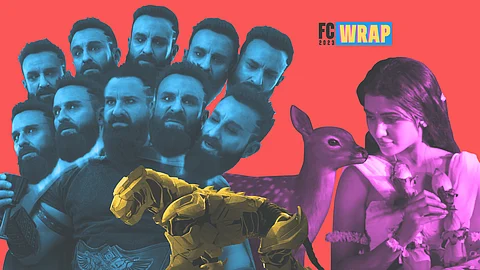
- Reviews
- Power List 2024
- Cannes 2024
- In-Depth Stories
- Web Stories
- News
- FC Lists
- Interviews
- Features
- FC SpecialsFC Specials

In 2011, Red Chillies' VFX team started a revolution with Ra. One — which, arguably, still holds up to this day. Subsequent developments in Indian CGI, however, leave much to be desired. The infamous CGI bull in Kalank (2019), for instance, was a misguided attempt at opulence (and male bravado). There was also the less-than-convincing crocodile of Mohenjo Daro (2016), embracing CGI absurdity with aspirations of avant-garde recognition.
Although Brahmāstra (2022) briefly hinted at technological parity, several films 2023 exposed a regression. Here we take a look at some of the CGI moments that made us pause, and take notice. Just not for the right reasons.
What is intended to be visual poetry ends up looking like a parody reeking of artificiality in every frame. Be it a forest or a royal kingdom, the fakeness is always glaring in its visuals. The worst of all has to be the war sequence between the army of King Dushyanta and the Demons. Why depend so heavily on VFX when you are clearly aware of the financial and creative constraints in place? This is a question that keeps poking at the audience throughout the runtime of the film, that has the aesthetic of a stage production in a school’s annual function.
Let's accept it. We were all prepared for Adipurush's VFX debacle but nothing could prepare us for the catastrophe we saw on the big screen. In a way, Adipurush was a first-of-its-kind experiment to come out of Indian cinema, having been shot entirely on green/blue matte, meaning everything in the frame — apart from the actors and a few basic properties they interact with — was generated using visual effects. This excessive reliance on the VFX was the film's biggest bane, with some of the ideas that might have sounded grand on paper — like the singing statues or Ravana's (Saif Ali Khan) slightly disturbing, and erotic snake massage, for instance, ending up looking downright farcical on the big screen.
Raghava Lawrence bursts out of a flaming bus with two children on his bike in P. Vasu's Chandramukhi 2. At no point are we concerned about anyone's well-being in the scene, considering how much of the sham of the visual is apparent. This is the hero's underwhelming introduction sequence — but that's not the worst of it. A sequel to the blockbuster Rajinikanth film Chandramukhi (2005), the real horror in the film is its CGI. From owls, panthers and snakes that are nothing like their real-world versions, to an astonishing climax where Kangana Ranaut fights Great Danes that look like they were made of playdough, the CGI in Chandramukhi 2 lends itself to plenty of unintentional comedy.
Ganapath is in the running for one of the ugliest films of our time. Sand doesn’t look like sand, wire mesh doesn’t look like wire mesh, cities don’t look like cities, houses don’t look like houses, crowds don’t look like crowds, and bike rides don’t look like bike rides. In the climactic speech with Ganapath standing in a boxing ring, foregrounded against a crowd, the background keeps glitching, changing dimensions and positions even as Ganapath (Tiger Shroff) remains in his spot. This film feels like it was breathed into life through a reckless green-screen.
Stories set in the future require world-building, character-building and state-of-the-art VFX. Ganapath is sorely lacking on all counts. At one point, Ganapath, says to other characters: “Yeh kaunsi Mad Max ki duniya mein reh rahe ho tum log? (What is this Mad Max world you are living in?)” The reference only exposes how woefully inadequate this film is. We could have made peace with the amateur, ridiculous VFX if the writing was a little more sophisticated, but alas it couldn’t be.
We were promised a Top Gun-level action spectacle. Instead, we were treated to helicopters resembling Lego figures caught in a live-action thriller — a spectacle that didn’t induce awe as much as existential questioning. The wide shots of airplanes, unfortunately, can easily trigger a comparison to Instagram filters, rather than something bearing resemblance to cutting-edge visual effects. The pièce de résistance of hilarity arrives when Kangana Ranaut, portraying Tejas Gill, strolls on the airstrip next to a plane that looks like it just stepped out of a digital rendering tutorial.
The issue with Tejas's CGI isn't a lack of funds but a glaring deficit in design effort. Perhaps a sprinkle of practical effects could have spared the film from the ignominy of a national eye-roll.
With inputs from Sowmya Rajendran and Ram Venkat Srikar.